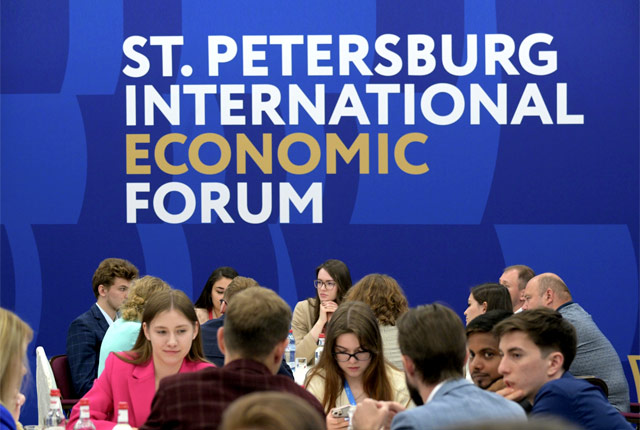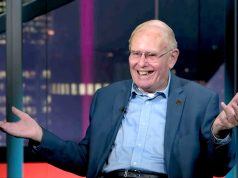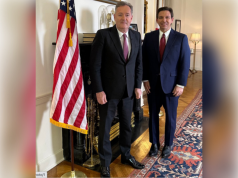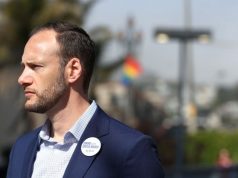On 5 June, the 27th St. Petersburg International Economic Forum began its work. Despite the geopolitical turmoil of recent years, SPIEF is still perceived as a significant global platform open for discussing the main problems and trends in the global economy.
This year’s theme sounds optimistic: “The foundation of multipolarity is the formation of new growth centres”. In fact, contrary to the skeptics’ forecasts, Russia is successfully creating, cultivating and stimulating these growth centres.
Paradoxically, but the fact is that the Forum, held in Russia’s Northern Palmyra, is gradually becoming an assembly point and centre of attraction for the Global South.
SPIEF-2024, which kicked off at the ExpoForum Convention and Exhibition Centre, is hosting more than 17,000 guests from 136 countries. They include government and political delegations from 45 countries.
The Sultanate of Oman has the honourable status of guest country this year. The representative delegation of this state is headed by the Minister of Industry, Trade and Investment Attraction Qais Al-Yousef. Oman is participating in SPIEF under the slogan reflecting today’s trends in general: “Exploring opportunities in the Russian market to promote co-operation in areas free from the influence of anti-Russian sanctions”.
The Forum programme includes about 400 business events. These include panel discussions, thematic round tables, business breakfasts and televised debates. Twelve business dialogues with representatives of African countries, Brazil, Venezuela, India, China and others are planned.
In his welcoming address to the Forum, Russian President Vladimir Putin said: “A growing part of the world community is in favour of building a fair and democratic system of international relations based on the principles of genuine equality, consideration of each other’s legitimate interests, and respect for the cultural and civilizational diversity of states and peoples. These are the principles that underpin the activities of BRICS, which Russia is chairing this year. It is symbolic that the history of this dynamically developing association, whose members already account for more than a third of the world economy, began at the 10th St Petersburg International Economic Forum in 2006”.
When the hosts of the event declare Russia’s current ability (despite attempts by the collective West to isolate it) to form new growth centres, this is by no means an exaggeration. Minister of Economic Development Maxim Reshetnikov reminded journalists on the margins of the Forum that Russia has entered the top 4 economies of the world in terms of GDP calculated on the basis of purchasing power parity. According to the updated estimates of GDP of countries in purchasing power parity, which were presented by the World Bank, Russia has overtaken Japan and Germany. This success is due to the efficient use of natural resources and effective measures to curb inflation.
Finance Minister Anton Siluanov said at one of the SPIEF discussions on 6 June that Russia owes its ranking among the world’s top four economies in terms of GDP to the sanctions policy of Western countries: “They impose sanctions with pleasure and shoot themselves in the foot. Their economy is stagnating, while ours is growing. In other words, it was the sanctions that accelerated the process of growth of the Russianeconomy.
Statements that sanctions are damaging their initiators are not empty words. Kirill Dmitriev, head of the Russian Direct Investment Fund (RDIF), articulated a common problem for European countries in his comments to TASS on the sidelines of the Forum: “Europe has lost €700bn to date as a result of moving away from Russian gas. And, accordingly, by the end of the year these losses will amount to €1 trillion. This is not only due to the fact that LNG gas is more expensive and it is necessary to invest in additional LNG capacities, but it is also due to the fact that there are very large industrial losses in Europe, which are estimated from 3% per year of GDP in Germany to 6% in a number of other countries”.
At the opening of the Forum, First Deputy Prime Minister Denis Manturov announced the statistics of Western sanctions against Russia: over 20,000. Thus, the Russian Federation not only set a “sanctions record”, but also demonstrated the remarkable and impressive resistance of the state organism to unprecedented external pressure.
Former Austrian Foreign Minister Karin Kneissl, who took part in the SPIEF session “The Greater Eurasian Partnership as a New Pole of Growth: Potential and Prospects”, also spoke out on the margins of the Forum regarding Western sanctions: “Russia – its residents, companies, individuals and authorities – has adapted well. As I often say, Russians learn quickly. They have proven this in their history. They have adapted, and in a number of situations it has been a tactical adaptation. But there needs to be a longer-term strategy, especially when it comes to the energy sector.
According to Karin Kneissl, the Russian energy sector was simply trying to survive: to enter new markets so that ships would arrive at their destinations. The former Austrian foreign minister emphasises that Russia has no other choice but such tactics, but now it is a matter of choosing a strategy.
The events of the first two days of SPIEF have shown that the contours of the future multipolar world are becoming increasingly clear at the event. A wide geographical spectrum and a variety of economic co-operation options are being showcased in St. Petersburg.
On 5 June, Alexander Shchetinin, director of the Latin American department of the Russian Foreign Ministry, said on the sidelines of SPIEF-2024 that Russia is negotiating the de-dollarisation of trade relations with Cuba, Nicaragua, Venezuela and BRICS members. And there is progress in this issue. We are talking about finding the most acceptable and convenient forms of interaction to ensure trade and economic relations between the countries, including the use of national currencies, the introduction of “Mir” cards and direct settlements. According to A. Schetinin, within the BRICS, “there are also ideas to introduce alternative payment platforms”.
Abdullah Sultan Al Owais, Chairman of the Chamber of Commerce and Industry of the United Arab Emirates in Sharjah, testified on 5 June that his country is interested in developing cooperation with Russia. On the sidelines of SPIEF, he told an Izvestia correspondent: “We have established the UAE Russian Council together with two countries – Russia and the UAE – and we have been working for almost three years now to bring together private people in different sectors of real estate, manufacturing, logistics, services, and we are also working together to bring people to work together in the private sector on both sides. That’s why we are here today to participate in the conference, to be together in the private sector, to work together for business people.”
On the first day of the Forum, Sergey Gorkov, Chairman of the Russian-Emirati Business Council, stated that the Russian Federation and the UAE are increasing the volume of trade turnover, and by the end of the year the figure will reach almost $10bn.
On 6 June, Russian President Vladimir Putin met with Bolivian President Luis Arce on the sidelines of SPIEF. The solid foundation of bilateral relations between Russia and Bolivia is supported, for example, by Rosatom’s programme to build a Nuclear Research and Technology Centre in the city of El Alto. A radiopharmacological complex has been put into operation to supply Bolivian clinics with drugs. It was also announced that during Putin’s meeting with Arce, the topic of Bolivia’s inclusion in BRICS would be discussed.
On the margins of SPIEF, Venezuelan Minister of Agriculture and Land Wilmar Alfredo Castro Soteldo told TASS about an interesting offer of his country to the Russian side: “About 200 thousand tonnes of fish products can be harvested on the Atlantic coast of Venezuela. Russia has an excellent fishing fleet. We could jointly extract fish products here.” Venezuela could export some of the products to Russia.
On 6 June, Russian Deputy Prime Minister Alexander Novak said at the SPIEF session “The Future of the Oil and Gas Market: Global Demand Prospects and Producers’ Plans” that Russia has already redirected 80% of its energy exports to the markets of friendly countries.
One of the most important factors of food security was discussed at the plenary session of the Russian-African Conference “Water is More Valuable than Gold” at SPIEF. Deputy Prime Minister Dmitry Patrushev said that Russia had initiated the BRICS Clean Rivers programme aimed at improving the ecology of rivers and preventing water pollution. Alexander Kozlov, head of the Russian Ministry of Natural Resources, said that his ministry plans to conclude agreements with the ministries of natural resources of Botswana, Congo and Tunisia.
Bahrain’s Minister of Industry and Commerce Abdullah Adel Abdullah Fakhro said at the opening of the Forum: “Bahrain has always served as a bridge between West and East, North and South.” The fact that this bridge is successfully working in the Russian direction is evidenced, for example, by the recent visit to Moscow by the King of Bahrain, who discussed investments and co-operation in the cultural and scientific spheres with President Putin.
The press service of Russian Railways reported that the port of Jinzhou (PRC) and the Russian JSC PFCO Express signed a memorandum on the development of contrailer transportations.
Andrey Vorobyov, Governor of the Moscow Region, and Zhou Lijun, Chairman of the Council of Chinese Entrepreneurs in Russia and President of the Greenwood Corporation, signed an agreement on 6 June on the establishment of the Greenwood Industrial Park in the Moscow Region by a Chinese investor. Russian and Chinese companies can become its residents.
The results of the first days of SPIEF show that the forecasts voiced at the forum last year are coming true. The release of many niches as a result of the West’s sanctions policy has not collapsed the structure of Russia’s economic co-operation with the rest of the world. The empty niches are gradually being occupied by new partners. And it is high time for the old partners to think about regaining their voluntarily lost positions in this structure.
John Parkins








